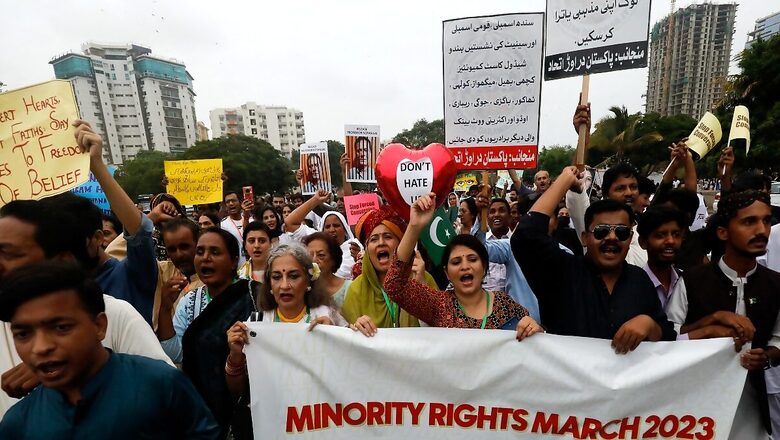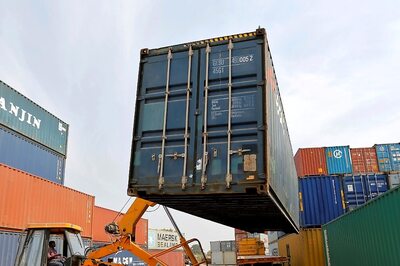
views
There is a common template of violence against minorities in Pakistan. The members of the Muslim community publicly accuse their immediate neighbours, with whom they have strained relations, of committing blasphemy. This is followed by an attack by a Muslim mob, leading to widespread destruction of property and loss of life. Such incidents are common in Pakistan. They also reflect the harsh reality endured by religious minorities in the country.
Time and again, these communities fall victim to mob violence, triggered by unfounded allegations from members of the Muslim community, often arising from trivial personal disputes. This recurring pattern of violence against minorities was recently witnessed in the Sargodha district of Pakistan’s Punjab province.
On May 25, a violent Muslim mob targeted the home of Nazir Masih, a Christian in his seventies, and his son, Sultan Masih, situated in the Mujahid colony of Sargodha district. The assault followed an accusation that Nazir Masih had desecrated the Quran by burning its pages. This accusation was levelled by their neighbour, Ayub Gondal, known for his affiliation with the fundamentalist political party Tehreek-e-Labaik Pakistan (TLP). The TLP, with its backing from the state and mainstream political circles, has a long history of perpetrating attacks to intimidate and persecute the country’s religious and sectarian minorities.
According to a fact-finding report by the Human Rights Commission of Pakistan (HRCP), Gondal’s accusation stemmed from a confrontation between his children and Sultan Masih, who resides in a neighbouring house adjacent to Nazir Masih’s. Although law enforcement agencies intervened to rescue the two families, Christian residents claimed that the Punjab police intentionally abandoned the septuagenarian, allowing the TLP-led mob to seek “retribution.” Nazir Masih passed away in a hospital on the intervening night of June 2-3.
Over time, Pakistan has gained notoriety as one of the most perilous environments for religious minorities, including Hindus, Ahmadis, and Christians, among others. State institutions have consistently supported fundamentalist groups like the TLP, which repeatedly perpetrate violence against minority communities, relegating them to the fringes of the country’s socio-political landscape. Consequently, these minorities have endured repeated acts of violence, such as targeted assassinations, lynching, mob violence, forced conversions, sexual violence against women and girls, and desecration of places of worship and cemeteries.
Pakistan has experienced a notable increase in cases involving the abduction and forced conversion of minority girls. According to the HRCP’s 2023 report, in Pakistan, more than 1,000 girls under the age of 16, primarily from Hindu and Christian communities, are abducted and compelled to convert to Islam every year. Despite the international outcry against this surge in forced conversions, successive Pakistani administrations have chosen to turn a blind eye in efforts to placate the majority community. Consequently, a UN report in 2023 expressed deep concern over the abduction of girls as young as 13, who are trafficked far from their homes, coerced into marriage with men often twice their age, and compelled to convert to Islam.
For instance, on February 12 this year, a 10-year-old girl named Laiba Suhail was kidnapped by four men from her home in the Faisalabad district of Punjab province. The men handed over Laiba to Shaukat Shah, a known local cleric with a history of forcibly converting minority children to Islam. According to media reports, Shah operates a criminal syndicate with the support of local authorities, including the police, who refrain from filing kidnapping cases against him. This local cleric coerces kidnapped children into filing court affidavits stating they willingly converted to Islam after being impressed by its teachings.
Based on affidavits, when the magistrate sends these girls to government shelters, Shah moves them to his seminary with the support of authorities. As Laiba’s father, Suhail Masih, lamented, it defies logic how a magistrate could rely on a coerced affidavit from a 10-year-old to approve such arrangements.
Similarly, in June 2021, a 12-year-old Christian girl, Farah was abducted, raped, shackled, before being forcibly converted, and made to wed her kidnapper in the Faisalabad city. It may be noted that under the Islamic Sharia law in Pakistan, marriages under the age of 16 are acceptable in case those marrying are Muslims. As such, the kidnappers forcibly convert the abducted underage minority girls before marriage and exploit the law to get the court’s approval.
In the case of Farah, it took five months of sustained pressure from many human rights bodies to push Punjab police to present Farah before the court. Surprisingly, on hearing her plea, the magistrate sent her to a women’s shelter instead of her parents, based on her coerced affidavit. Though the court finally nullified Farah’s forced marriage and allowed her to return to her family, there was still no action taken against her abductor.
Unlike Farah, in the case of the 13-year-old Arzoo Raja, abducted by 44-year-old Ali Azhar who also forcibly married her, in Sindh province, the court approved the marriage based on Arzoo’s affidavit signed under duress. Sindh Police even fabricated marriage papers which listed Arzoo’s age as 18, despite her government-issued birth certificate showing her as 13 years old. Pakistani authorities’ unwillingness to act against such crimes demonstrates their complicity in patronisation of such anti-minority activities.
Another prevalent method employed in Pakistan against its religious minorities involves allegations of blasphemy. Pakistan has probably the most stringent blasphemy laws in the Islamic world. These laws, intertwined across different sections of the Pakistan Penal Code (PPC), criminalise any action or expression perceived as insulting to Islam or its revered figures. For instance, desecration of places of worship carries a two-year prison sentence (Section 295), while disparaging Islam incurs a penalty of ten years imprisonment (Section 295A). Similarly, desecrating the Quran is punishable by life imprisonment (Section 295B), and any derogatory remarks, whether spoken, written, direct, or indirect, about Islam’s prophet or his companions, are punishable by death (Section 295C). Additionally, various provisions under Section 298 specifically target the Ahmadiyya community, criminalising their identification as Muslims.
Just a year before the recent Sargodha incident, in August 2023, Pakistan had witnessed horrific violence against Christians in Jaranwala, Punjab. The onslaught, again led by the TLP mob, resulted in the destruction of hundreds of homes, including over two dozen churches, forcing over 10,000 Christians to flee from the area. This violence erupted following baseless allegations of burning the Quran against two Christian men, Umar Saleem and his brother Umair Saleem. The incitement for vigilante justice came through mosque loudspeakers, leading to attacks on 11 Christian neighbourhoods in the city. Notably, the two brothers, charged under Sections 295 A, B and C, were acquitted by a Pakistani anti-terrorism court in March 2024. The court ruled that these men were falsely implicated in a carefully orchestrated scheme by resentful Muslim neighbours.
Consequently, the majority Sunni community of Pakistan has frequently exploited these legal mandates against minorities to settle personal disputes. This systematic misuse of blasphemy laws and the ensuing mob violence against minorities have tragically become commonplace in Pakistan, resulting in shattered lives and fractured families. According to the HRCP’s 2023 report, the abuse of these laws and the perpetration of mob violence against minority communities were described as “recurring phenomena” in Pakistan.
In Punjab province alone, authorities recorded 179 blasphemy cases in 2023. A total of 552 individuals were incarcerated in the province for blasphemy-related offences, including 19 children. Among those detained, 485 are awaiting trial, 44 have been convicted, and an additional “23 were either ‘unconfirmed’ as condemned or on death row”. Similarly, in Sindh, 82 people were imprisoned under these laws in 2023.
As Pakistan’s religious minorities face intimidation from the majority through abductions, coerced conversions, and blasphemy accusations, there is an urgent need for thorough reforms to protect the rights and honour of these persecuted communities. The international community must step up to pressure Pakistan into ensuring the rights of every individual are respected, putting an end to the unchecked support of certain socio-religious groups that have consistently targeted religious minorities without consequence.
The writer is an author and columnist and has written several books. His X handle is @ArunAnandLive. Views expressed in the above piece are personal and solely that of the author. They do not necessarily reflect News18’s views.




















Comments
0 comment